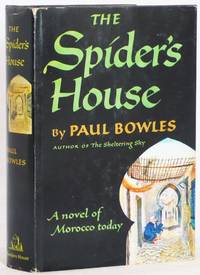
Paul Frederic Bowles was an American expatriate composer, author, and translator. He became associated with the Moroccan city of Tangier, where he settled in 1947 and lived for 52 years to the end of his life.
Mohamed Choukri was a Moroccan author and novelist who is best known for his internationally acclaimed autobiography For Bread Alone, which was described by the American playwright Tennessee Williams as "A true document of human desperation, shattering in its impact".
"A Distant Episode" is a short story by Paul Bowles. Written in 1945, it was first published in the Partisan Review and republished in New Directions in Prose and Poetry, #10 in 1948. It is also the title piece in a 1988 collection of Bowles's short stories, A Distant Episode: Selected Stories by Ecco Press.

Up Above the World is a novel by Paul Bowles first published in 1966 by Simon and Schuster and in Great Britain by Peter Owen Publishers in 1967. Up Above the World was the last of Bowles’s four novels.
Allal is a short story by Paul Bowles written in Tangiers in 1976 and first published in the January 27, 1977, issue of Rolling Stone. It appeared in his short fiction collection Things Gone and Things Still Here (1977) published by Black Sparrow Press.

The Delicate Prey and Other Stories is a collection of 17 works of short fiction by Paul Bowles, published in 1950 by Random House.
"Tapiama" is a short story by Paul Bowles. It was first published in May 1958 by John Lehmann in The London Magazine. It later appeared in the collection of his short fiction, The Hours After Noon, published by the Heinemann in 1959. The story was subsequently published in A Distant Episode: The Selected Stories by Ecco Press in 1988.
"Pages from Cold Point" is a short story by Paul Bowles. It was first published in the Autumn 1949 issue of Wake: The Creative Magazine. It was republished in New Directions in Prose and Poetry #11. It later appeared in a collection of his short fiction, The Delicate Prey and Other Stories, published by Random House in 1950. Bowles wrote the story in 1947 while aboard the MS Ferncape en route to Casablanca from New York.
"The Echo" is a short story by Paul Bowles written in 1946 and first published in the September 1946 issue of Harper's Bazaar magazine. It was later published in a collection of his short fiction, The Delicate Prey and Other Stories, published by Random House in 1950.
"You Are Not I" is a short story by Paul Bowles written in 1948 and first published in the January 1948 issue of Mademoiselle magazine. It later appeared in the collection of his short fiction, The Delicate Prey and Other Stories (1950), published by Random House.
"At Paso Rojo" is a short story by Paul Bowles, written in 1947 and first published in the September 1948 issue of Mademoiselle magazine. It later appeared in a collection of his short fiction, The Delicate Prey and Other Stories (1950), published by Random House.

The Spider’s House is a novel by Paul Bowles and first published by Random House in 1955.

The Time of Friendship is a collection of 13 works of short fiction by Paul Bowles published in 1967 by Holt, Rinehart and Winston. A number of the stories included in this volume appeared earlier "in various places during the 1950s and 1960s."

A Hundred Camels in the Courtyard is a collection of short fiction by Paul Bowles published by City Lights Books in 1962. The volume was the first collection of his works published in the United States since The Delicate Prey and Other Stories (1950).
"Tea on the Mountain" is a short story by Paul Bowles. Written in 1939, the story first appeared in the 1950 collection The Delicate Prey and Other Stories published by Random House. In the United Kingdom, it was published under the title "A Spring Day" in the collection A Little Stone.
"The Hours After Noon" is a short story by Paul Bowles. It was first published in 1956 in Zero Anthology of Literature and Art #8, ed. Themistocles Hoetis. It later appeared in his collection of short fiction, The Time of Friendship (1967), published by Holt, Rinehart and Winston.
The Hyena is a short story by Paul Bowles. It was first published in Transatlantic Review #11. It was later included in his short fiction collection The Time of Friendship (1967) published by Holt, Rinehart and Winston.

Things Gone and Things Still Here is a collection of nine works of short fiction by Paul Bowles, published in 1977 by Black Sparrow Press. The volume is the sixth collection of Bowles’s work, much of which is re-published material.
"You Have Left Your Lotus Pods on the Bus" is a short story by Paul Bowles written in Tangiers in 1971 and first published in his short fiction collection Things Gone and Things Still Here (1977) by Black Sparrow Press.

Midnight Mass is a collection of 12 works of short fiction by Paul Bowles, published in 1981 by Black Sparrow Press. The volume is the fifth collection of Bowles’s work, much of which is re-published material.